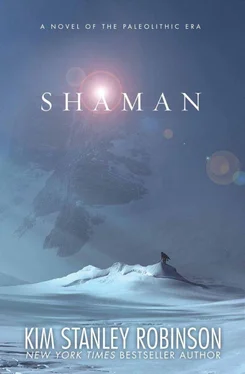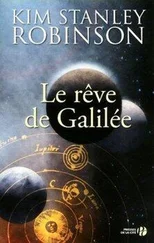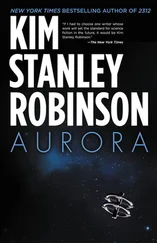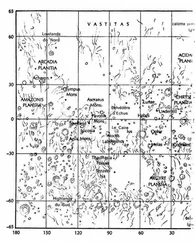They made good time on the trail climbing the ridge between the two loops, and were on the ridge by sunrise. All the sky to the east was orange, and they agreed this meant it would probably snow two mornings later. Then Moss laughed and said,—Does it ever happen that way?
Loon laughed too. Moss’s laugh was particularly infectious. He was slighter than Hawk, with a narrow handsome face under a thick tangle of black curls. His face was very flexible and expressive, one moment as sharp as if knapped, the next slack-lipped and foolish.
—I do think snow comes after the sun shows its ears, Loon said.
—Or the moon, Moss agreed.—It’s the snow in the air getting lit up. The light bounces off the snow in the air just like off any other snow.
The light was definitely bouncing off the snow on the ground. They pulled down their caps to their eyebrows and tilted their heads down and to the side to hike up the ridge into the low winter sun. Loon’s cap was edged with marten fur, Moss’s with wolf.
When the snow warmed up in the sunlight enough to soften a little, they stopped and tied their snowshoes to their shoes and continued on to the first traps, set in the ravine mouth where Steep Creek ran into the main creek of Next Loop Down. There was a giant rock called the Robin’s Nest standing in the little meadow at the confluence of these two creeks, sticking out of the blanket of snow so tall that its top was still over their heads as they passed it. The creeks under the dips in the snow were frozen, the land silent. No birds, no animals; snow everywhere, except on the rock faces too steep to hold snow. These ragged gray walls breaking the snow blanket here and there were just begging to be painted, Loon felt, and two or three they passed were: the sight of the sacred animals in red or black, vivid in all the white and blue of snow and sky, caught his breath in his throat. The air was cold, and Moss was singing a little hunter’s ditty to himself. In places the snow was so feathery they sank knee deep even with their snowshoes on. Big lumps of soft snow balanced on every bunch of pine needles in the trees around them.—You should bring some of this feathery snow back for Elga, Moss said.
Drinking water melted from such snow would make her child light-footed. Loon laughed and said,—Good idea.
They came to the first trap, which was a pit Moss and Nevermind had dug the summer before, down into the soft dirt of the meadow. At the bottom of the pit they had put sharpened sticks and blades of knapped rock, and then covered the hole with light poles and leaves. It was only under a blanket of snow that this kind of trap was likely to catch an animal, and now as they snowshoed into the meadow, they could see that something had crashed through the roof of the pit, leaving an odd hole in the land. They rushed to the edge of the hole and looked down. A big red stag had fallen through and broken a foreleg at the bottom of the pit, and after that frozen to death. Now its dead eyes looked up at the sky as if the beast’s spirit were nearby, and using its old eyes to get its bearings.
—What is he doing here! Loon exclaimed.
—Helping us out. Thanks old man! But couldn’t you have jumped out of this pit and died up here?
Moss clapped Loon on the arm. It was an excellent bit of luck, though it meant a hard afternoon for them, first getting down safely into the pit, and then hauling the stiff body onto a frame made of trap poles that held it barely chest high, from which position they could get under it and shove it up together, out of the pit. They were just strong enough to push it up, and in their first try the stag’s body crashed back down into the pit and they had to skip away through the stone shards like squirrels to get out of its way. It stared up at them with its fixed cloudy gaze. The second time they were more careful and it went better. All the while the beast kept looking at them.
—What do you think he was thinking at the end? Loon asked.
Moss shook his head and frowned. Loon only said things like this when he was alone with Moss; the others would just joke at such questions. But Moss regarded the stag’s big weird eyes, which somehow conveyed so clearly its mute endurance, and pushed his mobile face through any number of expressions to show he was thinking, before venturing,—Maybe he was just thinking he should have been walking one leg at a time to test the snow. That’s probably what I would be thinking.
—But not only that.
—No. No, he was probably sad. Maybe thinking of his wives. It’s strange how deer have rectangular pupils, isn’t it? They look like they’re from somewhere else.
—Thorn says animals’ eyes show they don’t have human souls. There’s no flutter or movement, they’re always just stuck there in one position looking.
—So our soul is in the whites of our eyes? I don’t believe it. This deer looked at you just like you looked at him. There’s no difference except the square pupils, but even so you can see just what he’s thinking, I mean look at him! Hey, we’re sorry about this, brother, he said to the frozen deer,—but we need to eat. So thanks for helping us out!
And with that he plunged his spear between two neckbones and began to slice between them. After that they took turns in the low sun skinning the body and cutting it up with their spears. Under the spear tips the frozen meat had its usual hardness, crystalline yet flexible; they thrust between joints, bent them apart with twists from the end of the spear, cut back and forth at the meat. The blood still frozen in the beast’s veins was going to be much prized by their women back at camp. It took hard work for most of that short day to get the body into pieces they could carry in their sacks and haul behind them through the snow, using its own halved skin as a rough rope to drag them along.
By the time they were ready and on their way, the sun was low in the west, casting long black shadows over the snow, which was hardening quickly back to a surface they could walk on without snowshoes. They were a long way from home, and when the sun went down behind the hills to the west, the air quickly got much colder. But there’s always heat in hurry, as the saying had it, and without discussing it they picked up their pace and cronched over the snow side by side. It was only when it was this cold that they could hike this hard without overheating. It came on them again; they were made to run in cold like this.
Behind them the moon rose. It was the first night after full, and the fat moon turned the sky a thick twilight blue, which then infused the white snow under their feet. A world of blues: when they came to the broad ridge between loops, and could see far up and down the gorge of the Urdecha, and over the hills on both sides of it, the sky and the land were still so lit by the blue moonlight that they felt they could see everything. It was Mother Earth at her most beautiful, her every curve and declivity glowing distinctly; though blanketed by snow, it was in these moony nights that she looked most naked, the bare blue flesh of her hillsides smooth and curvaceous.
Before the last drop to Loop Meadow they stopped and looked around wordlessly at it for a while. Nothing moved, no wind, no sound. It was like a spirit world, a world beyond the sky, where the stillness quivered with a mystery. The few stars were fat and blurry, and they swam about as Loon blinked and blinked in the cold. They stood inside a black starry bag, on a white body, and everything was much bigger than could be grasped. So many times they had gone out at night during full moons to see things look like this, all the way back to when they were little boys, slipping out of the big house when most of the women were in the women’s house and there was no one to catch them. Loon and Moss were the two who liked it most.
Читать дальше











